

Catholic Diocese of Auckland








Catholic Diocese of Auckland





Dear brothers and sisters in Christ,
2024 began with the opening of St Ignatius of Loyola Catholic College near Drury and it ended with Holy Name Parish, Warkworth, preparing to leave their church site of 115 years and move to a new site on the road to Matakana. Both changes were reflective of the changing face of our Diocese and the communities that make up our Diocese. Both changes were reflective of people looking forward and enabling the Diocese to meet not only present needs but also the needs of the future. I am grateful for those who have had insight into the future and exercised wise stewardship.
The Second Vatican Council reminded us that the Church is the pilgrim people of God. The Church, or in other words the kingdom of Christ now present in mystery, grows visibly through the power of God in the world (Lumen Gentium 3). In 2024 we saw this in our Diocese. Between 2023 and 2024 Mass attendance rose by 10% across the Diocese. At Easter 500 people were received into the Church. Seven men were accepted to enter the Seminary at the start of 2025. The Spirit of God has been active and alive in our Diocese as people seek to follow the call the Lord has been placing on their hearts. We have much to be thankful for.
I want to take this opportunity to thank you all – people, religious and clergy – for all you do to make Christ present in the life of the Diocese. This is a work we do together as a Church. I hope that as you read this report, you will rejoice with me in all the Lord has done through us.
Today we seem to be entering a period that is marked by people who are searching for the truth and love of Jesus Christ. This is an exciting time to be part of the Church. And yet in that, we cannot remain the same for the Spirit calls each one of us ever forth as individuals and together as communities within the Diocese. And as we change, Jesus Christ, who is the same yesterday, today, and forever (cf Heb 13:8), walks with us enflaming our hearts.
As we give thanks for what was in 2024, let us pray that we might be ever more attentive to his voice as he leads us into the future. May we, like Mary, be docile to the Holy Spirit, the same Spirit that impelled the disciples to leave the closed room and proclaim Christ to the world. May we follow in their footsteps.
Yours faithfully in Christ the Good Shepherd
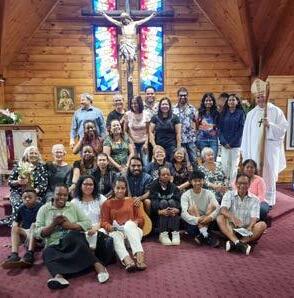
“The Spirit of God has been active and alive in our Diocese as people seek to follow the call the Lord has been placing on their hearts. We have much to be thankful for.”
✠ Steve Lowe Bishop of Auckland
• Regional gatherings were held to explore HOW we can be a synodal Church in mission ahead of the second and final part of the Synod on Synodality held in Rome in October.
• Fr Mosese Tui SDB (Parish Priest of St Paul’s Parish in Massey) was ordained the new Archbishop of Samoa-Apia.
• In a unique and historic opportunity, we welcomed the relics of 11 saints from the Eastern and Western Catholic Churches.
• Holy Name Warkworth Parish purchased a new site in Matakana in November, and transitioned to a new church and pastoral centre in January 2025.
• Renovations at a number of churches, including a refurbishment of St Francis and St Therese Church in Pt Chevalier, restoration of a character Presbytery building at St Joseph & St Patrick’s Church Helensville, a new roof at Sacred Heart Church Dargaville and removal of asbestos and a refurbishment at St Dominic’s Church in Blockhouse Bay.
• After 30 years, the Growth in Faith Together community gathered in gratitude for the final time at the Telford Road ‘GIFT’ Centre. A new space has been established at Pompallier Diocesan Centre.
• Eight men were commissioned to the Order of Acolyte, a ritual step in the journey of ordination to the Permanent Diaconate in August 2025.
• Te Kamaka. Tūturu Māori, Tūturu Katorika, a framework for Māori and Catholic education resources, was launched this year at Matariki. Authentically Māori, Authentically Catholic.
• Senior students in three primary schools experienced a Journey with Jesus retreat facilitated by the coordinator of Catholic Schools Youth Ministry (CSYM) from the Canberra Diocese.
• 3635 secondary school students impacted by Encounter Day retreats led by the National Evangelisation Team (NET).
• New Local Youth Ministers’ initiative was announced for a local youth minister, who will work across a secondary school and parish providing ongoing discipleship to students.
• Construction at a number of our Catholic schools and colleges, including a new learning centre comprising 19 classrooms built at De La Salle College, and a 10-classroom and library block at St Joseph’s School in Otahuhu, and 2 new science laboratories at Liston College.
• Catholic Caring Foundation gave out grants to agencies who provide wrap-around services to youth, elderly, families, and migrants.
• Catholic Housing Network established to increase housing options for vulnerable people within the Catholic Diocese of Auckland.
• Refugee families who fled Iraq due to anti-Christian persecution were sponsored by the Catholic Diocese of Auckland and the Chaldean Catholic Community to settle in Auckland.
• NZ Catholic moved from a printed newspaper to a monthly digital publication.
• St Mary’s Parish in Northcote, in collaboration with De Paul House, established “Mary’s Pantry” a food cooperative to remove that feeling of ‘being in need’ and replacing it with a feeling of hope, dignity and choice.
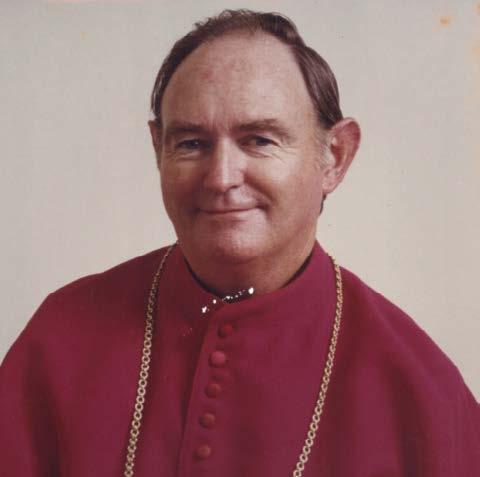
21 September 1937 – 1 September 2024
Bishop Cook Islands and Niue | 1977-1983
Tenth Bishop of Auckland | 1983-1994
Second Bishop of Hamilton | 1994-2014
We remember with love and gratitude The Most Reverend Bishop Emeritus Denis Browne , CNZM, who died on Sunday 1 September 2024. He was 86.
Bishop Denis was born in Auckland on 21 September 1937, the son of Neville John and Catherine Anne Browne. Bishop Denis attended St Michael’s Primary School, Remuera, and St Peter’s College, Epsom, before entering Holy Name Seminary, Christchurch, and Holy Cross College, Mosgiel.
Bishop Denis was ordained a priest on 30 June 1962 by Archbishop Liston of Auckland, at the Cathedral of St Patrick and St Joseph, Auckland. After ordination, he was assigned to parish work in Gisborne, where he served from 1963 until 1968. He also served in Papatoetoe [1968–1971], Remuera [1972–1975] and Tonga-Nuku’alofa, Houma,`Eva [1975–1977].
On 29 June 1977 he was consecrated bishop in St Patrick’s and St Joseph Cathedral, Auckland. Bishop Denis served as Bishop of the Cook Islands and Niue until 1983. He became the tenth Bishop of Auckland on 24 August 1983, and served in that post until 1994 when he was installed as the Diocese of Hamilton’s second bishop.
In 1990, Bishop Denis was awarded the New Zealand 1990 Commemoration Medal, and in the 2001 Queen’s Birthday Honours he was appointed a Companion of the New Zealand Order of Merit for services to the community.
The late Pope Francis accepted Bishop Denis’ resignation on 22 November 2014, and his successor Stephen Lowe, now the 12th Bishop of Auckland, was appointed as the 3rd Bishop of Hamilton. Bishop Denis was the principal consecrator at Bishop Steve’s episcopal consecration.
Bishop Denis was one of six children. Both his brothers Neville (RIP) and Michael (RIP) were priests. Two of his sisters Margaret and Agnes are Sisters of Mercy. Mary (RIP) married.
Eternal rest grant unto him, O Lord, and let perpetual light shine upon him. May he rest in peace.
182,691 CATHOLICS (2023 CENSUS) 68 PARISHES
15 ETHNIC CHAPLAINCIES
STUDENTS
10,632 PRIMARY
13,670 SECONDARY 23,952 TOTAL
CATHOLIC CHARITIES 7 SCHOOLS 42 PRIMARY 16 SECONDARY
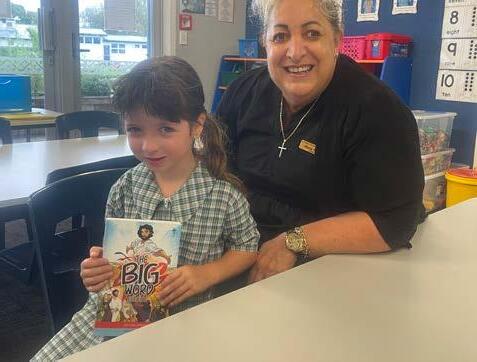
St Francis Xavier Parish Whangarei supports the Catholic School in their initiative to spread the Word of God, and ensure that all new, new entrant families coming to the school will have a family Bible. Between 50 and 80 bibles are gifted to families each year. These bibles are used by students to do their RE homework.
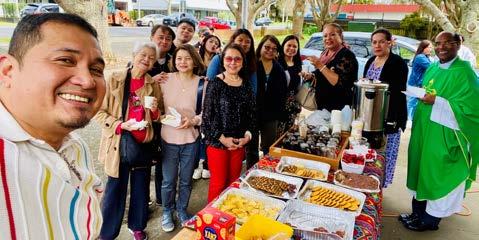
The parish leadership team and hospitality group work together to build community. They had a name tag Sunday to encourage parishioners to get to know each other over morning tea after Mass. Other initiatives include a regular Communi-tea after Mass, a Valentines Dance, cultural food stalls and a High Tea where parishioners dressed up.
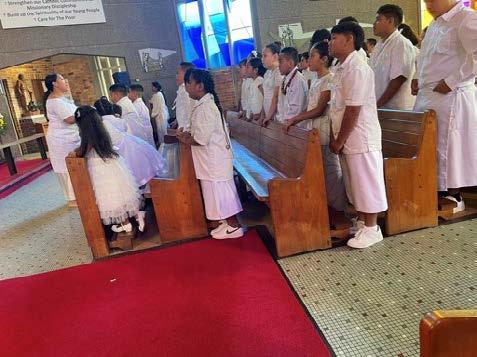
Te Rā o Ngā Tamariki Children’s Day is a day we celebrate children and their importance in the community, honouring their joy, curiosity, and potential. At St Joseph’s Parish in Grey Lynn members of the youth group planned a Mass for those who attend Children’s Liturgy of the
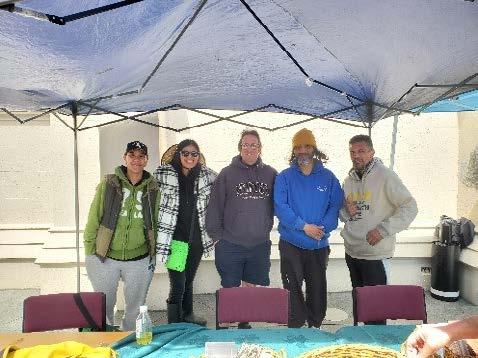
On World Homelessness Day, Brian, Ekana, Conrad, Kiriana, Des & Laura represented the Cathedral of St Patrick & St Joseph who, together with other partners, supported our Homeless Community in Tāmaki Makaurau, Auckland. The Cathedral team gave out sweets and prayer cards, had chats, and met many lovely people and shared kai.
Every year, on the first Sunday in December, St Ignatius Parish in St Heliers comes together to pack and distribute Christmas food hampers to local families in need. Last year, they raised $36,000, delivering 325 hampers to families, supported by Te Waipuna Sisters of Mercy, Glenbrae Primary
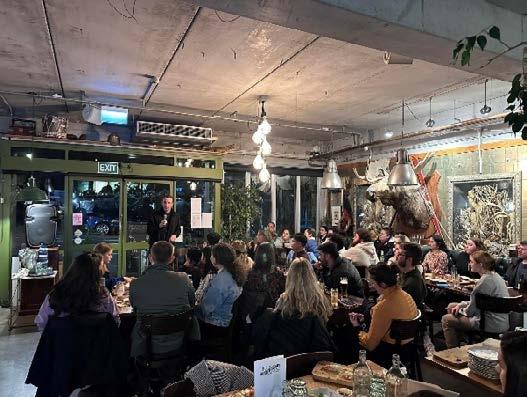
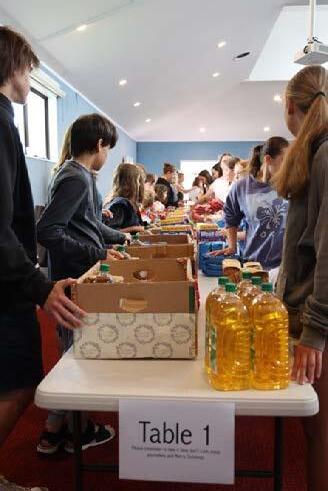
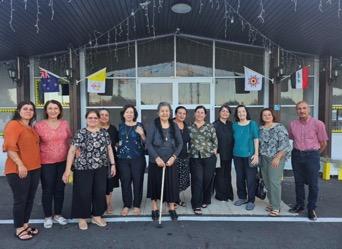
St Addai the Apostle Chaldean Catholic Parish is utilising their Facebook page to build community and for teaching. Their initiatives include regular posts of parishioners with the caption “Good morning from New Zealand” and Q&A posts where a question is asked, e.g. “Why do Christians go to Mass on Sundays?” The post includes a response answering the question.
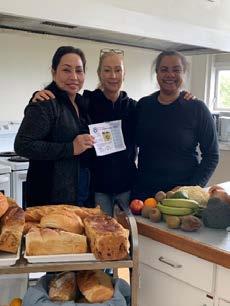
St Mark’s Mission Parish in Pakuranga offers regular Theology on Tap sessions for young adults at a local eatery. Young adult Catholics and their friends (including some who may not be Catholic) can gather to hear from a speaker, discuss theological topics and connect with their faith.
Mary’s Pantry Food together Project Mary’s Pantry, an initiative of St Mary’s Parish in Northcote, in collaboration with De Paul House, aims to support those experiencing financial hardships by replacing the transient feeling of being in need with feelings of hope and dignity – a hand up, not a hand out – and in turn bring about an improved sense of resilience, empowerment, social connection, health and well-being. They started providing Food together Bags of fresh fruit and vegetables to families on 26 July 2024. Since they started, there have been 10 collection dates where they provided 194 bags to about 80 families (total number of people fed was 306).
I would firstly like to say “thank you” to all our hard-working and faith-filled clergy, volunteers, employees, supporters, and friends all.
Bishop Steve leads us in the most important eternal matters of faith, teaching, worship and governance of the Diocese.
Many good people are involved in assisting him with the more temporal or administrative affairs – women and men who guide, govern, and serve the many works, apostolates, departments and entities, that comprise the Diocese as a community of communities. I want to acknowledge them all with gratitude, and take this opportunity to give a focused report on the temporal affairs of the Diocese in 2024.
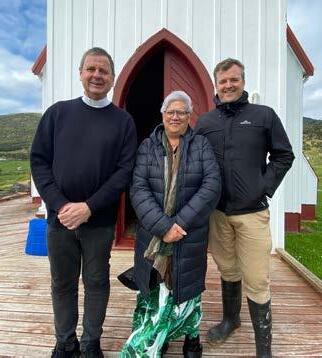
In the graph on the following page, I have highlighted where the Diocesan Group’s expenditure went in 2024. This entire report is aimed at sharing some of that work, but the graph gives you a snapshot at a glance.
The work of allocating finite and, often tagged, diocesan resources, is undertaken with a depth of discernment. Our hope is to promote the gifted people of God within the Diocese to be witnesses to Christ, apostolic in their endeavour, at the service of the world together. “Our world, wounded by war, violence, and injustice, needs to hear the Gospel message of God’s love, and to experience the reconciling power of Christ’s grace.” (Pope Leo, 2025)
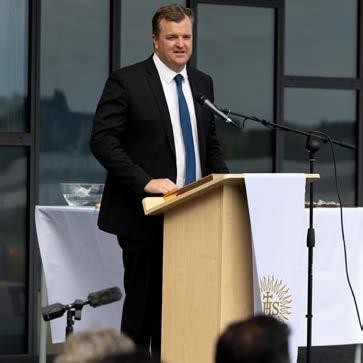
“Our world, wounded by war, violence, and injustice needs to hear the Gospel message of God’s love and to experience the reconciling power of Christ’s grace.”
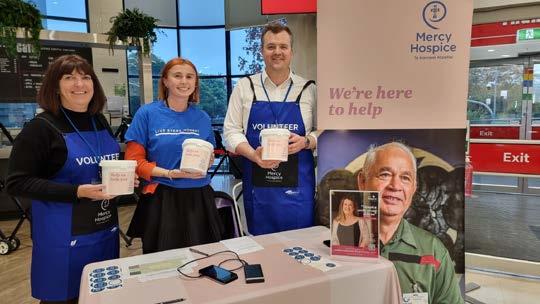
Pope Leo, 2025
This is lived out in the following main areas:
• Education was our biggest area of expenditure, comprising 48% or $44m worth of expenditure. This encompasses the renewal of end-of-life classrooms, the development of new infrastructure, and the provision of scholarships.
• Social services and housing outreach is the second biggest area of expenditure across the group, with 39% or $35.29m directed towards social housing and wraparound support to families in material hardship, for social work and counselling, and for grants to those in need.
• Pastoral services and formation represent 8% or $7.2m of expenditure. This includes things like our seminary, youth ministries, marriage and family, marriage tribunal services, theological college, chaplaincies to the sick and prisons.
• Admin and governance comprises the smallest area of expenditure, and rightly so. 5% of our group expenditure goes into property, finance, attendance dues collection, management and admin team.
The pages of this report reflect a church that is vital and growing. The number of people engaged in worship each week across Sunday Masses rose nearly 10% returning to pre-COVID levels. There was a 13% increase in the number of people who became Catholic. Academic performance across Catholic schools improved with 79% of students in Bishop owned schools achieving University Entrance compared to the national average of 48%. Our schools serve a cross section of the socio-economic demographic.

The outreach of the Church continued to grow, with Catholic Social Services, Monte Cecilia Housing Trust and De Paul House reaching 5,320 people with counselling, social work, and housing services. The Diocese doesn’t receive enough funding for all its activities
In 2024 Pope Francis had an emphasis on the financial reform of the Holy See. You might have seen news stories about the Vatican running at a deficit. The late Holy Father wrote to Cardinals in June last year saying “a further effort is now required from everyone so that a ‘zero deficit’ is not just a theoretical objective, but an actually achievable goal”. (Pope Francis, September 2024).
The focus on financial sustainability by the Holy Father is something the Diocese of Auckland has also become more focused on. Most of the income we receive is tagged to a type of expenditure, for example Ministry of Education maintenance grants are to be spent on school maintenance; grants from Oranga Tamariki, MSD, MHUD, Kāinga Ora, can only be used for the purpose of providing social housing, social work or counselling. Overall, 94% of our operating income is required to be spent on a specific purpose, either for contractual or regulatory reasons or because of the intent of the donor. That means that only 6% of our operating income is revenue from which the Bishop can discern how to allocate.

This commentary should be read in conjunction with the full audited financial statements and accompanying notes, which provide a comprehensive view of the Diocese’s financial position and performance. The financial statements of the Roman Catholic Diocese of Auckland Group are available at www.charities.govt.nz.
This year, our consolidated group results show a surplus for the period of $32.959m and a $7.01m surplus before net financing income. The surplus before net financing income is almost entirely made up of accumulated earnings from the Monte Cecilia Housing Trust (which are being held to repay loans for housing developments) and School Property maintenance grants from the Ministry of Education (which are used to maintain state-integrated schools).
Grants for property maintenance are required to be reported through the income statement when received, while the expenditure on those capital projects like housing or schools are capitalised and only written off over many years.
$7.015m
$14.976m used for capital expenditure – end of life school building renewal
$3.189m will be used to repay building loans
Separating out school property maintenance and social housing funded by government grants, the Diocese reports a deficit before net financing income of $11.151 million.
Our net assets give a distorted picture of the “wealth” of the Church
The Catholic Church took root in Aotearoa New Zealand in the 1830s, and over almost two centuries has built up a wide range of educational and charitable activities. The Diocese stretches from the Far North to the Firth of Thames, Coromandel, and is comprised of close to 200,000 Catholics, 100 churches, more than 50 schools, and many other charitable and community services.
The Diocese’s long history and its sheer size and scale means that our net assets reported in our financial statements are very large. It’s important to remember that most of these assets – about 75% – are property held for a long time, in the form of schools and other community facilities like St Peter’s College in Epsom or De Paul House, a transitional and social housing provider in Northcote. These assets are not transactable assets like any other commercial property portfolio.
The Diocese has received bequests over the years ranging in size and purpose. Some donors specify a purpose, others provide a legacy for the discretion of the Bishop to apply to whatever charitable purpose he might decide is appropriate. Some legacies are spent and used up in the near term, others are given with the intention of protecting the capital and only using the investment returns. A generous bequest from the Late Harold Plumley is an example of a gift that has been established in an endowment, and is invested with the intention of being an intergenerational legacy. The “Plumley’ endowment has already contributed toward long term aspirations like the St Ignatius of Loyola College, Drury, where part of the school was funded by the bequest in addition to debt which was serviced by attendance dues.
The Diocese is responsible for $187m in liabilities as at 31 December 2024, rising from $177m the year before. This increase is driven by a mixture of increase in long term borrowings and deferred income. Long term
borrowings rose to $108.2m at balance date and this is predominantly for school infrastructure serviced by attendance dues. We are reaching close to our prudent maximum debt ceiling at present and need to exercise continued care with our debt levels in the coming years. Deferred income totalled $37.35m and mostly comprises of Policy One funding which is long-term maintenance funding held for CDA owned and parish primary schools.
The Diocese also has a wide range of unknown liabilities ranging from costs associated with the restoration of buildings nearing the end of their life, like the Cathedral’s Liston Hall, to potential costs associated with the national redress scheme recommended by the Royal Commission.
What are we doing to meet fiscal challenges?
1. Inviting support for the Church’s mission. In 2024, we established a small, part-time gifting and development office, to enhance the way we make invitations for offerings to the works of the Church. The first focus of this initiative was to help the Cathedral climb out of deficit and to provide an improved seminary appeal. This year, we are focused on assisting parishes to improve their giving programmes to accommodate our increasingly cashless society. We are also creating an opportunity for offerings for the Shine TV Mass. It is the Bishop’s expectation that no offering compromises a person’s ability to provide for their whanau or their own essential needs.
2. Ensuring we have resilient long-term endowments. We are continuing to make sure legacies and investments work as hard as they can to support the intent for which they were given and to enable the Bishop’s mission. In recent years we have been improving the structure and allocation of the Diocese’s investments, reflecting prudent financial management and a focus on long-term sustainability. These investments are mainly comprised of bequests, and we are confident that donors would want their legacies working as hard as they can to support the mission.
3. Seeking fairness in our school building programme. Our attendance dues collection at schools remained resilient in 2024, with a collection rate of 98%. We also provided financial assistance to 473 students, and Reuben O’Neill Bursaries were awarded to 11
promising students. Families love Catholic schools in Auckland, but the cost burden of growing the network has meant the Bishop has indicated that we are coming to an end of an era where State Integrated School proprietors are going to be able to build new schools.
Bishop Steve has asked Education Minister Erica Stanford for reinstatement of Policy 2 – historic funding given to expand state integrated schools.
4. Re-purposing under-utilised assets. The Diocese is working on developing any property that is not actively contributing to the immediate or long-term needs of the Church or providing for a mission need. A new property committee is in place, advising us on this strategy and ensuring that we steward any property assets no longer meeting the mission needs of the church as effectively as possible in the coming years. An example of this is the decision to sell land in Silverdale that had been set aside for school purposes. After careful review, the Bishop has decided to sell this land given that building new Catholic secondary schools is cost prohibitive, particularly when the site is adjacent to an established Christian secondary school.
5. Focus on value for money. Our team has left no stone unturned in trying to find savings and ensure that we are getting good value for money in all our expenditure. The Diocese has found $781,000 in cost savings in the last couple of years, in line with Bishop Steve’s call to reshape for our time. Over time, administration and services have evolved and the Bishop is encouraging us to ask do they meet today’s Mission of the Church?
Insurance costs have also stabilised, and the Diocese continues to ensure value for money while protecting the ongoing use of our community infrastructure like churches, schools, marae and community housing.
The work of financial stewardship is the responsibility of many people, and we look forward to helping continue the path to ever-more prudent use of finite diocesan resources so that God’s mission can be lived out across the Diocese.
James van Schie General Manager
We acknowledge with Manaaki and respect the passing of Kiingi Tuheitia, Bishop Denis Browne, Pat Lythe (Chair of the Justice & Peace Commission), and Frank Heffernan (long-serving Board member of the Catholic Caring Foundation and St Vincent de Paul Society). We give thanks for their contributions to the community.
New Zealand has been in a prolonged economic recession: during 2024 this had a major impact on those living in poverty, and those that are marginalised, especially the elderly and children. This economic downturn led to increased poverty, unemployment, and
housing insecurity. In response, the Justice and Peace Commission met with young adult parishioners to reassess its focus while continuing its advocacy, particularly on the Restoring Citizenship Removed by Citizenship (Western Samoa) Act 1982 Bill. The bill was successfully passed into law on November 26, 2024, after significant efforts from key figures such as Deacon Sanele Poluleuligaga and Loraine Elliott.
The Justice and Peace Commission were well represented in the Hikoi o te Tiriti, and were one of the first written submitters to oppose the Principles of the Treaty of Waitangi Bill 2024.
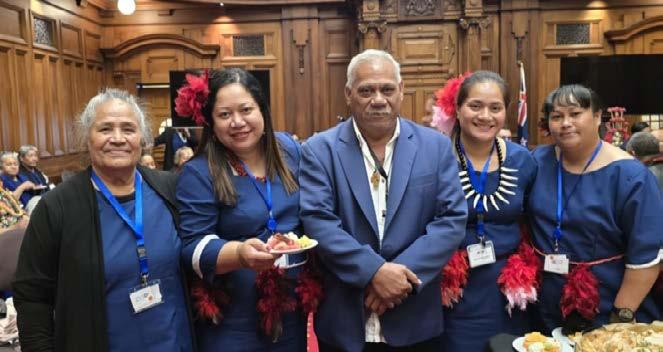
“The Justice and Peace Commission were well represented in the Hikoi o te Tiriti, and were one of the first written submitters to oppose the Principles of the Treaty of Waitangi Bill 2024.”
The Caring Foundation focused on addressing the needs of rural and remote communities, including a notable project in Waitaruke. Working with Te Kura o Hato Hohepa Te Kamura School, the Foundation supported the creation of a vegetable garden and fruit orchard, teaching children gardening skills, environmental care, and collaboration. Additionally, the Foundation aided an elderly couple in Mangamuka by providing a water pump, improving their access to water. We are grateful to all our donors, including parishes and schools and the Tindall Foundation, and note that we are the local donation manager for the Catholic Diocese of Auckland.
Catholic Social Services played a crucial role in combating family violence, especially in rural communities like Panguru, through the Aotearoa Living without Violence programme. Funded by the Todd Foundation, this programme was adapted to meet local needs, and counselling services were provided to community members. Catholic Social Services also plans to expand its services to Te Taitokerau in 2025–2026, to address complex social issues such as homelessness and intergenerational trauma.
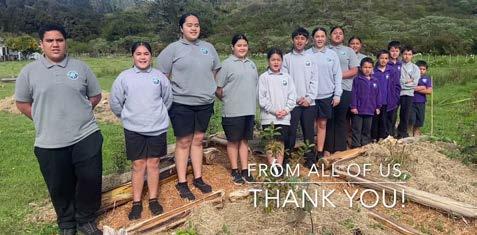
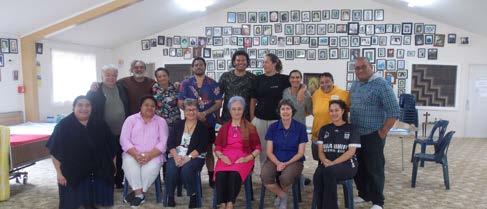
Deacon Sanele Poluleuligaga, the Vicar for Social Impact Loraine Elliott (and her husband Lance), and Tofilau Bernadette Pereira of St Vincent de Paul Vinnies Central, joined Bishop Steve Lowe, Monsignor Bernard Kiely, Pa Peter Tipene, Fr Michael Endemann and, 25 Priests from New Zealand, in Apia Samoa, to witness the ordination of Fr Mosese Tui as the new Archbishop of Samoa-Apia. This event, attended by a large crowd, included a symbolic handover of leadership from the New Zealand contingent to the Samoan people, marked by a traditional Te Ao Maori Karanga.
The Catholic community in Tāmaki Makaurau continues to adapt and respond to social and economic challenges, showing resilience and compassion through its various initiatives.

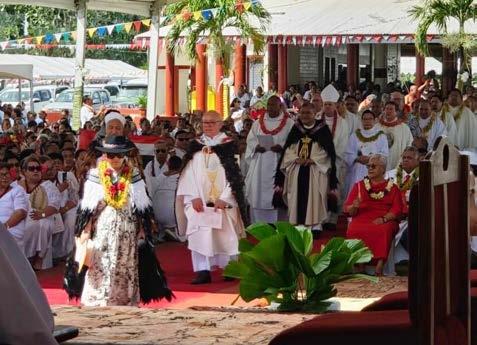
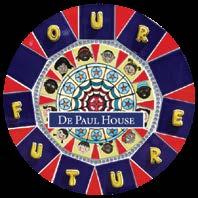
De Paul House has been advocating and supporting low-income families facing housing issues and financial hardship for over 39 years. In 2022 we extended our service to singles and couples aged over 65 years, in direct response to the increase in referrals.
In 2024, we experienced a surge in housing and family support inquiries, receiving 644 calls for assistance, and successfully rehousing 153 families and seniors (561 adults and children) into affordable, warm, and permanent homes. Despite employment, education, and health challenges, our social housing portfolio maintained 100% occupancy across 12 properties. We remain dedicated to progressing and expanding our social housing portfolio.
We offer learning programmes in our Community Learning Centre for adults, and a stimulative learning environment for preschoolers in our Early Childhood Centre, a significant stepping stone to strengthen family resilience and independence.
Testimonials from our participants highlight the impact of our programs:
• “The computer skills I learnt are
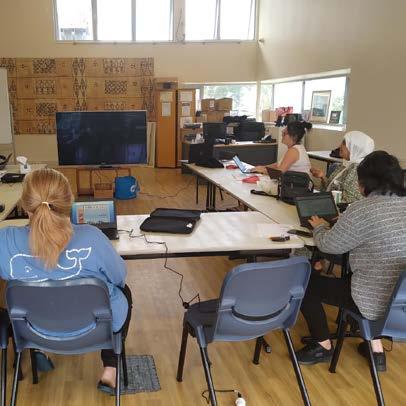
helping me in job hunting now.”
– Computer Class participant
• “I learnt to navigate rentals and understand my responsibilities.”
– Ready to Rent Class participant
• “I am loving the Triple P parenting course. I use these skills every day with my 2-year-old son.”
– Triple P Class participant
Collaboration with our community is key to the wellbeing of our client base. We acknowledge the unwavering support of our volunteers, the Catholic Diocese of Auckland, North Shore parishes and local schools, especially Rosmini and Carmel College.
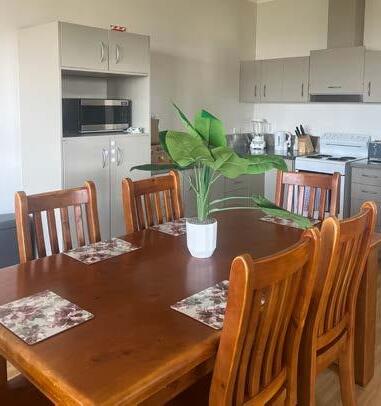
People who lived in properties managed by Apostolates:
2,372 Monte Cecilia Housing Trust
561 De Paul House
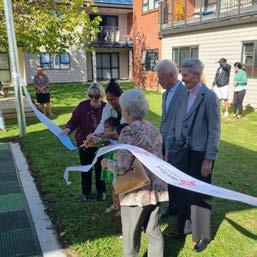

St Dominic’s Church
“I am happy that me and my whānau are well-supported by the Monte Cecilia Housing Trust and with all the whānau support workers that have helped us achieve our goals. I am lucky to be a part of this ongoing support and I really appreciate the help we receive. Thank you very much.”
Thomas (not his real name)
– an apostolate of the Catholic Diocese of Auckland
Monte Cecilia Housing Trust:
Monte Cecilia Housing Trust is a for-purpose organisation dedicated to providing social housing and wrap-around support to low-income families in the West and South Auckland areas. Operating now for over 40 years, Monte Cecilia is a cornerstone presence in the ongoing battle against housing insecurity in Auckland.
2024 has been a year in which Monte Cecilia Housing Trust adapted proactively to changes resulting from the government’s scaling back of community housing objectives. While conditions have not been ideal for external growth, our focus has continued with strengthening internal systems and processes, and further improving the quality of our services for vulnerable families.
This pivot has significantly enhanced our ability to positively impact families living in Monte Cecilia accommodation, enabling us to make the most effective use of available resources.
While considerable mahi remains, Monte Cecilia is now better positioned than ever to support
families in achieving their housing goals, and we remain committed to continuous improvement, ensuring Monte Cecilia Housing Trust is resilient and ready to serve our communities, both today and into the future.
High-level stats:
• Across 2024 Monte Cecilia housed 6159 people.
• Over 2024 Monte Cecilia managed 583 properties
□ 249 were Transitional Housing
□ 334 were Community Housing
• When asked how satisfied tenants were with their Monte Cecilia tenancy, 71% rated their satisfaction at 7/10 or higher, and 47% rated it 10/10.
• 80% agreed or strongly agreed that their Monte Cecilia housing allowed them to feel safe at home.
• 77% agreed or strongly agreed that their Monte Cecilia housing situation contributed positively to their overall wellbeing.
• 71% agreed or strongly agreed that Monte Cecilia Housing Trust’s Whānau Support Coordinators helped them improve their situation.
The James Liston Trust Hostel provides temporary housing for up to 50 people at any one time. Their mission includes a range of practical, relevant and hands-on help and support while people seek permanent housing for those experiencing homelessness or rough sleeping. The hostel is managed by Auckland City Mission, with financial support from the Methodist and Catholic churches. Their work is inspired by the example of Christ, who stood in solidarity with the oppressed and marginalized. Many of the hostel residents have faced significant, often intergenerational, challenges and disadvantages. As a result, they live with highly complex needs. The combination of deep expertise, high-quality programmes, and profound human care from the Auckland City Mission, creates an environment of safety, dignity, and hope at the hostel.
Onsite Services at the Hostel include:
• Accommodation: Up to 12 weeks for singles and couples.
• Meals: Three daily meals.
• Support Services: Housing, community support links, nonjudgmental environment.
• Facilities: Communal spaces, 24-
hour staffing, laundry.
• Programmes: Budgeting, art therapy, health outreach, harm reduction, cultural empowerment.
• Activities: Karaoke, games, fitness, outings.
In this Jubilee Year of Hope there is much hope for the future: The Hostel maintains strong relationships with governmental and community partners, ensuring ongoing support for their services. Their aim is to evolve into a responsive healing centre, meeting the growing needs of our community.
He waka eke noa
A report from the Hostel commended the ecumenical example set by the James Liston Trust. Every day, we are all confronted with news of communities and nations fractured by the global rise of nationalism and tribalism. How can the followers of Christ effectively address such divisive forces if we ourselves remain entrenched in denominational sectarianism? Our three churches strive to foster a more inclusive, compassionate, and interconnected world. Yet, we largely undertake this work in our separate channels. By fully embracing the principles of Kotahitanga, especially across
our social services, we can not only deliver greater value to the community, but also set an inspirational example of collaboration and collective wellbeing.
James Liston Hostel Summary of activity DEC 2023 - DEC 2024
Occupancy Rate: 84.79% (Turnover includes room cleaning, maintenance, and repairs).
Residents Served: 188 individuals.
Average Stay: 51 days.
Challenges Residents Face: Complex Needs: Mental health, addiction, trauma recovery.
Housing Availability: Limited affordable options and long waitlists.
Financial Stability: Affects transition readiness.
Health Status: Ongoing support needs.
Discrimination and Barriers: Challenges in securing private rentals.
Social Support: Limited community networks.
He Māori ta te Ariki koutou e karanga nei; he Māori koutou nō te Hāhi, te tinana kotahi o te Karaiti.
It is as Māori that the Lord calls you; it is as Māori that you belong to the Church, the one body of Christ.
Pope
St John Paul II (22 Nov 1986)
Miha Māori
There are 19 communities that celebrate a regular Miha (Mass in te reo Māori). Every weekend in the Diocese there are at least seven Miha Māori.
Katekita Training
Katekita are leaders in Māori Catholic communities that work with priests, and also in the absence of priests to provide pastoral care for Māori Catholics. A strategy to train katekita is being formulated for the communities in the far north.
Te Kamaka. Tūturu Māori; Tūturu Katorika
Te Kamaka. Tūturu Māori, Tūturu Katorika, a framework for Māori and Catholic education resources, was launched this year at Matariki. The framework is being developed by the Vicar for Māori and the Catholic Schools Office. Approximately 2300 students in Catholic schools in the Diocese identify as Māori.
Te Rōpū Whakamāori
Te Rōpū Whakamāori, the Māori Translation group, are currently working on a te reo Māori Prayer/ Miha/Readings App, a Māori Catholic Hymnal and accompanying audio/visual resources, and a te reo Māori Lectionary. The Auckland

members are Pateriki Butler, Rewi Pene, Geremy Hema and Manuel Beazley.
The Vicar for Māori led a 100+ Diocesan delegation to the tangi for Kiingi Tuheitia. At the tangi, Catholic connections to the kiingitanga were acknowledged. The new monarch, Kuini Nga wai hono i te po, is baptised and confirmed in the Catholic Church. It is our intention in the Jubilee Year to make a pilgrimage to Tuurangawaewae to acknowledge Kuini Nga wai hono i te po.
XVI Assembly of the Synod of Bishops
Manuel attended the second session of the Synod of Bishops. On one of the days of the Assembly, Manuel led prayer in te reo Māori to the delight of the Holy Father.
Pope Francis announced that the Assembly’s Final Report will stand as the official document of the Synod, which is not the usual convention. The Final Report has now been given over to the Universal Church by Pope Francis with the request that it be “accepted”, and calls upon the local churches “to implement, in different contexts, the authoritative indications contained in the document”. (Pope Francis’ letter dated 25 November 2024)
Ordination of Hemi Ropata SM
Whilst in Rome for the Synod, Manuel supported Hemi Ropata SM who was ordained to the diaconate. Hemi is from Ngāti Raukawa, Ngāti Tai and Ngāpuhi. Hemi grew up in Ōtara. Hemi is expected to be ordained to the priesthood in July 2025 here in Auckland.
Over the last few years, Catholic schools in the Auckland Diocese, along with other schools, have been researching their links with mana whenua, local iwi and hapu, and learning about their local history. The Catholic schools of Auckland have a common heritage tracing back to early contact between Māori and Catholic settlers in the North, Bishop Pompallier, and the early French missionaries. Te Kāmaka aims to identify what Auckland schools’ Māori and Catholic heritage should look like, sound like and feel like today, in terms of Matauranga, Tikanga and Te Reo. This is Te Kāmaka, the Rock on which our schools can stand and be TŪTURU MĀORI, TŪTURU KATORIKA, authentically Māori, authentically Catholic. Launched in November, Te Kāmaka can be accessed through the Diocesan website.
While students in our secondary schools have opportunities for Retreats with LOGOS and the NET team, up till now primary schools have not had the same access. Late in 2024, senior students in three primary schools experienced a Journey with Jesus retreat, facilitated by the coordinator of Catholic Schools Youth Ministry
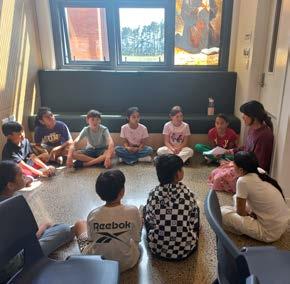
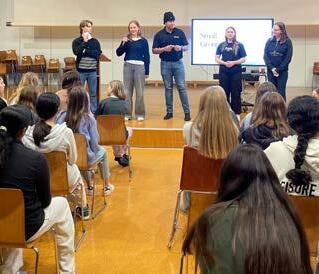
In 2024, we were pleased to host a National Evangelisation Team (NET) for the second year of our NET pilot project. The team made a powerful impact by:
• Leading retreats for 12 secondary schools across 28 Year Levels
• Launching a fortnightly youth ministry at St Joseph & St Joachim Parish, Ōtāhuhu
• Supporting key events around the Diocese
We are excited to welcome NET back to the Diocese in 2025!

(CSYM) from the Canberra Diocese. A feature of this type of retreat is the involvement of senior secondary students who lead small group discussions, activities, and share their own journey with Jesus. The students were from Sancta Maria College, and have been involved with CSYM at the College for two years. After the retreat, students are invited to join a group to deepen their faith and learn to share it with others.
3635 secondary school students impacted by NET retreats
55 NET retreat days. 80% of students said they wanted to engage more with their faith after their retreat day.
30 young people attending the fortnightly youth group launched at St Joseph & St Joachim Parish, Ōtāhuhu.
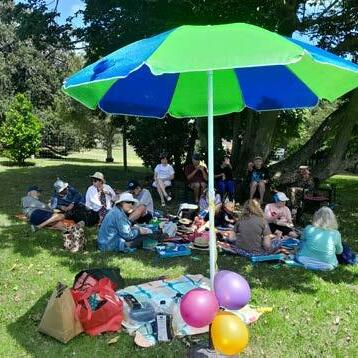
“Thank you for such a vibrant, lovingly devoted & engaged Mass on Shine TV, to you Father, & all your parishioners. Very much appreciated. From a viewer in a Care Facility.”
The Pastoral Services Group (PSG) offers a diverse range of help and services to faith communities, to create a supportive, inclusive, and vibrant Diocese that can effectively meet the spiritual, emotional, and faith needs of the Diocesan whānau.
While some events facilitated by PSG, such as World Youth Day Auckland, Rise Up Ethnic Festival, the Rite of Election, attract significant numbers of people, PSG also clusters smaller groups of people to share faith and life, be formed and to celebrate. Opportunities such as Advent Morning Meditation, regional youth leader Meet-Ups, parish secretary mornings, not only help and nourish participants, but build a sense of collaboration and identity as a Diocesan family. Although many of these occasions are faceto-face, post-pandemic we are still using the skills learnt during lockdown of meeting and sharing via video. Many of the larger events are made possible through the generous gifts of time and talent by the volunteers working with PSG.
Our prison and hospital chaplains continue to provide spiritual and emotional support to people in various life situations and challenges.
This year the religious education programme for people with intellectual disabilities moved homes from the Balmoral site of the former Growth In Faith Together (GIFT) residence, to a welcoming space at the Pompallier Diocesan Centre. The GIFT program continues to promote inclusivity, by encouraging and supporting participation and acceptance in the life of the Diocese.
The Liturgy pages of the Diocesan website are the most visited. They provide weekly and seasonal resources prepared by the Liturgy Centre to support the liturgical practice of parishes, and are appreciated across New Zealand and internationally. Additional to liturgy resources, PSG compiles and provides resources for many aspects of community life, including faith formation, sacramental preparation, youth groups, family faith and parent support.
To include all in Diocesan liturgies and events, PSG helps theologically form and encourage a pool of NZ Sign Language (NZSL) interpreters. They assist the Diocese in providing for a monthly NZSL Mass and monthly interpreted parish Mass.
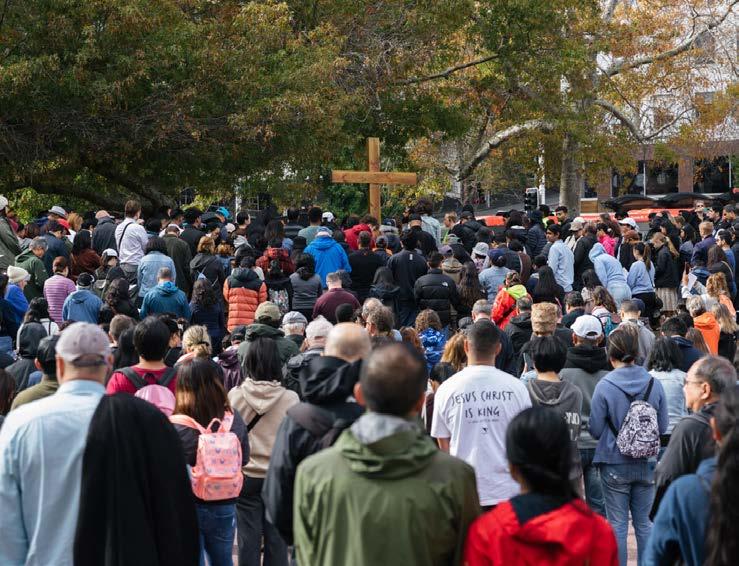
Stations of the Cross through the streets of Auckland
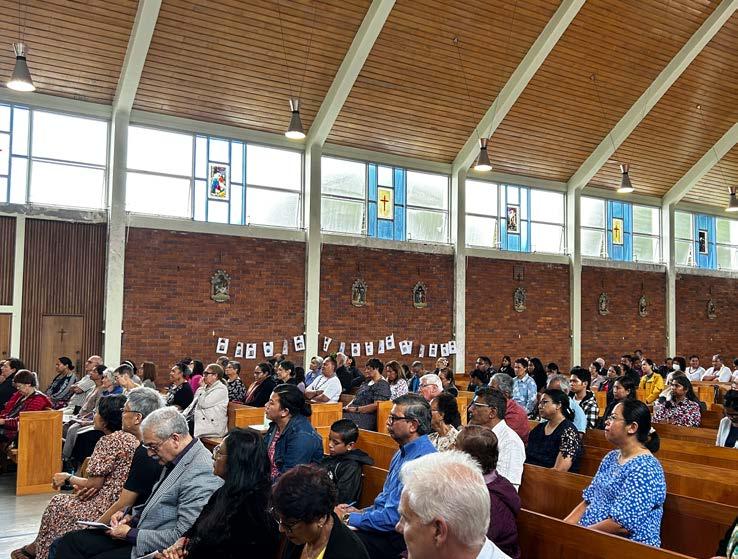
9,807 people attended PSG facilitated events
977,821 digital engagements
177 home visits by Pastoral Worker to the Deaf
Volunteers
• 24 couples gave 1113 hours to support engaged couples in their marriage preparation
• 94 people served with the Ministries to Young People Team for 1078 hours
1617 individual sessions provided to prisoners by our prison chaplains
13 Alpha Courses including 6 for youth
263 couples completed Marriage Education courses
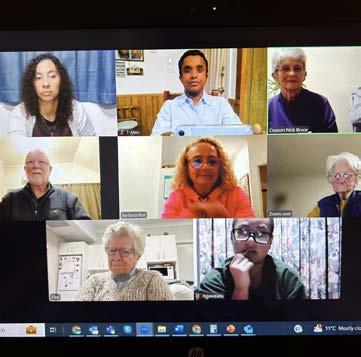
The presentation was very engaging and personable. I really enjoyed listening to the stories. The prayers were lovely. Thank you. Faith Formation
The Pastoral Services Group (PSG) gathers people to form them for mission: supporting, encouraging and nurturing missionary discipleship. Formation for Mission is about upskilling. All members of the Diocese are invited to participate. It endeavours to equip the many who volunteer in the Diocese to use their gifts and talents to serve others, and bring Gospel values to their communities.
Through formation, individuals are also given the skills and confidence to engage with and support one another in their faith journeys. Ministry is not a solitary endeavour. Formation events encourage people to support one another, to share their struggles and successes, and to pray for each other.
Recognising the diversity within the Diocese, formation for ethnic community leaders is offered. These programmes aim to empower leaders from various cultural backgrounds to serve their communities effectively. Parish workers and secretaries also received specialised formation. These people are the backbone of parish life.
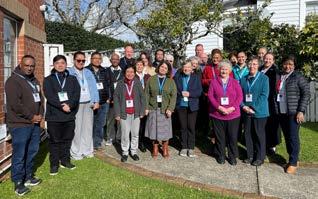
The Masterclass series and Summit weekend were designed by Ministries to Young People, to deepen the theological and spiritual understanding of those leading youth and young adult groups. These sessions provided insights into scripture, Church teachings, and the practical application of skills for leadership.
Marriage education is another key aspect of formation for mission. Strong marriages are vital for supporting strong Christian communities.
Other formation was also offered for a diverse range of Diocesan initiatives; RCIA Teams, leaders of Wings Ngā Parirau, Sacramental preparation teams, readers and extraordinary ministers of Eucharist, pastoral councils.
The focus of Safeguarding in 2024 was the findings of both the Royal Commission into Abuse in Care in Faith-Based organisations, and the recommendations from the UK-based GCPS review into the National Safeguarding standards, commissioned by the New Zealand Catholic Bishops Conference. Both these crucial documents have given us an opportunity to plan further into the future, continuing our preventative measures as well as considering how we will respond and work together with survivors.
Workshops throughout 2024 were extremely popular, with an increase of 58% in attendance, both face-toface and online. The new model of bringing volunteers from all parishes and entities together has been very successful, and will continue in 2025.
Within the Safeguarding workshop it is strongly encouraged that people speak up when something is not right. In response to this there has been an increase in people coming forward with a general disclosure when things are not right and someone has felt unsafe. Feedback has shown that workshops have not only increased the knowledge of the participants. It has also been helpful and relevant in their current ministry.
2025 we know will bring some challenges however in this Jubilee Year, nevertheless we will continue the Safeguarding Journey as true Pilgrims of Hope.
Safeguarding Life Cycle – Entities and Parishes move in a cyclical manner representing the stages of the Safeguarding journey – Development; Growth; Maturity and Renewal; and as part of the Safeguarding review, each parish will be assessed as to its current stage.
For the year ended 31 December 2024
Catholic Diocese of Auckland
Consolidated Statement of Comprehensive Revenue and Expense
For the year ended 31 December 2024
Revenue
transactions
revenue
Revenue
Catholic Diocese of Auckland
For the year ended 31 December 2024
Consolidated Statement of Financial Position As at 31 December 2024
The Catholic Diocese of Auckland, established in 1848, serves as a spiritual home for thousands of faithful across the region. Our focus is centred in the teachings of Jesus Christ and the traditions of the Catholic Church.
The Diocese encompasses a diverse and vibrant community, reflecting the rich cultural tapestry of our region. We are a network of parishes, schools, and various ministries that cater to the spiritual, educational, and social needs of our community. We are committed to fostering a vibrant, welcoming and inclusive environment where all individuals can grow in faith and love.
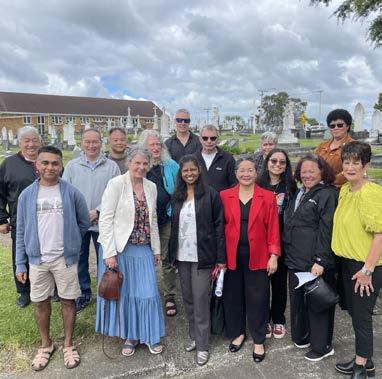
Spiritual Growth: to nurture the spiritual growth of our community. Through the celebration of the sacraments, liturgical services, and various faith formation programmes, we strive to deepen the faith of our parishioners, and guide them on their spiritual journey.
Evangelization: to bring more people into a loving relationship with God, and to build a vibrant, faith-filled community of communities through our evangelization efforts.
Note 1: Average weekly attendance over the month of November.
Education: to provide quality Catholic education through our system of schools. Our educational aim is to develop the whole person—intellectually, morally, and spiritually—preparing our students to be responsible and compassionate members of society.
gained NCEA Level 3
percentage of students across Bishop-owned Catholic Colleges who gained 12 or more credits for NCEA Level 3 Religious Studies
percentage of students across Bishop-owned Catholic Colleges who gained University Entrance
assistance administered by CDA
outstanding: Diocesan funding for new buildings/land at Bishop-owned integrated schools
Community Service: to serve those in need. Inspired by the Gospel, we are committed through our various outreach programmes and charitable initiatives to support the marginalized and vulnerable, promoting social justice and the dignity of every person.
Number of people provided with advocacy or assisted with housing and social services by Monte Cecilia Housing Trust
Number of people assisted with outreach support by De Paul House
Number of client contacts with Catholic Social Services – Counselling and Social Work
Total grants paid to 81 agencies from Catholic Caring Foundation (85 in 2023) $700,944 $1,215,648
who live in Monte Cecilia Housing Trust-managed properties
housed on-site at De Paul House
By leaving a gift in your Will to the Catholic Diocese of Auckland, you help strengthen the Church’s mission for generations to come. Your generosity supports parishes, clergy, youth ministries, Catholic education, and vital outreach programmes. No matter the size, your bequest ensures that faith continues to flourish in our communities. A simple act of love can make a profound difference.
To learn more about how you can leave a gift in your Will, contact us today.
giving@cda.org.nz

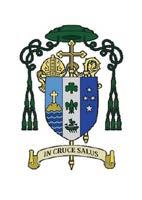

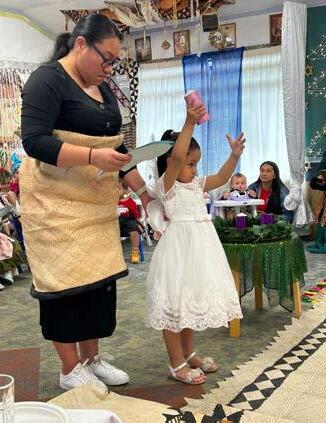
Celebrating the Christmas Story, as part of the end-of-the-year performance for
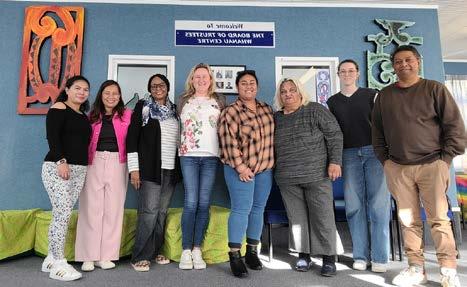
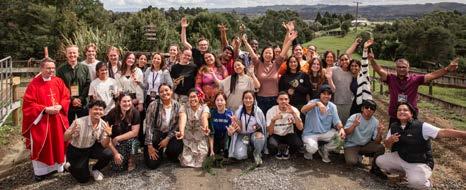
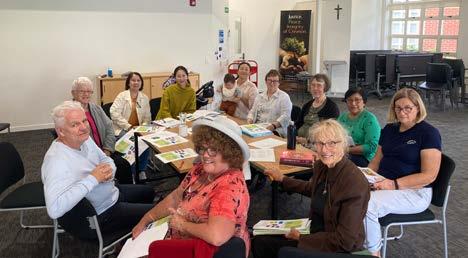
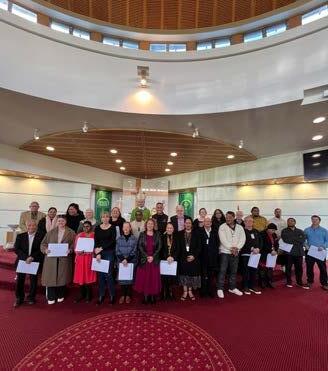
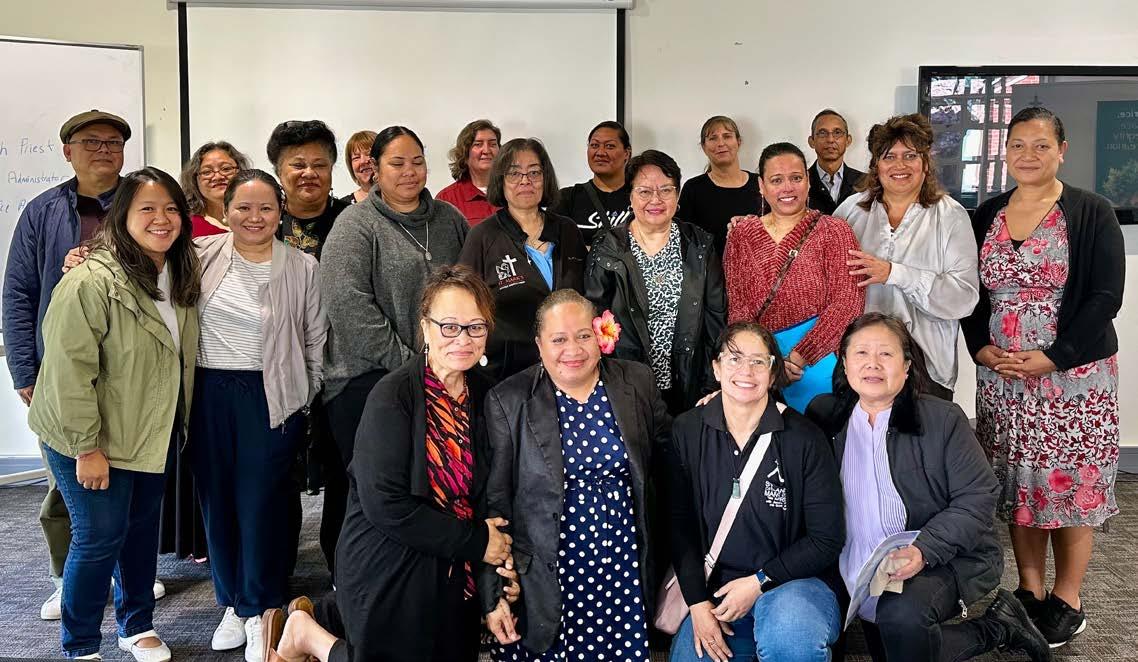
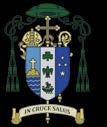
Catholic Diocese of Auckland Te Taumata o te Hahi Katorika
Pompallier Diocesan Centre, 30 New Street, St Mary’s Bay, Auckland 1011 Private Bag 47904, Ponsonby, Auckland 1144 www.aucklandcatholic.org.nz www.facebook.com/AucklandCatholic www.facebook.com/BishopSteveLowe www.youtube.com/AucklandCatholic +64 9 378 4380
The Roman Catholic Diocese of Auckland Ecclesiastical Goods Trust is a registered charity (CC29112).